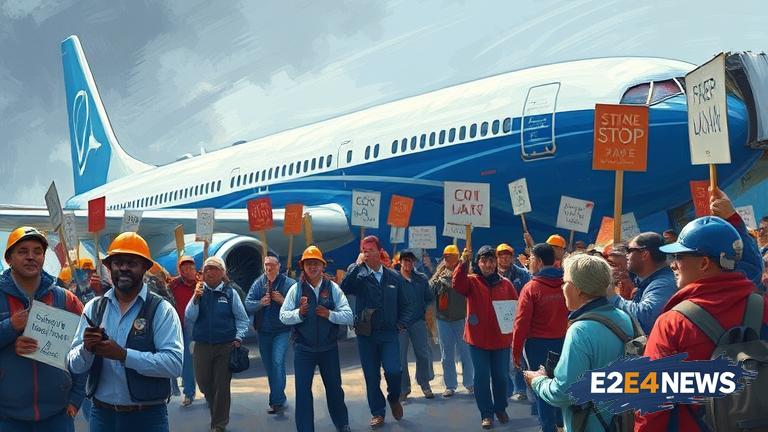A recent strike by Boeing workers has brought attention to the unfair labor practices and poor working conditions faced by employees in the aerospace industry. The strike, which involves thousands of workers, is a response to the company’s alleged failure to provide fair compensation, safe working conditions, and job security. Workers are demanding better pay, benefits, and working conditions, as well as an end to the company’s practice of outsourcing jobs to non-union contractors. The strike has significant implications for the aerospace industry, with potential disruptions to production and delivery of aircraft. Boeing, one of the largest aerospace companies in the world, has faced criticism for its treatment of workers, including allegations of union busting and unfair labor practices. The company has denied these allegations, but workers claim that they have been subjected to intimidation, harassment, and retaliation for speaking out against unfair labor practices. The strike is also seen as a response to the company’s efforts to increase productivity and reduce costs, which workers claim have come at the expense of their safety and well-being. Workers are demanding a fair contract that addresses their concerns and provides better working conditions, pay, and benefits. The strike has received support from labor unions and advocacy groups, who argue that workers have the right to fair compensation and safe working conditions. The company has offered a tentative agreement, but workers have rejected it, citing concerns that it does not address their key demands. The strike is ongoing, with workers picketing outside Boeing facilities and rallying support from the community. The dispute has also drawn attention from government officials, who have called for a resolution to the strike and an end to unfair labor practices. Workers are determined to fight for their rights and secure a fair contract, even if it means continuing the strike for an extended period. The strike has significant implications for the economy, with potential disruptions to production and delivery of aircraft. Boeing is a major employer and a key player in the aerospace industry, and the strike could have far-reaching consequences. The company has faced criticism for its handling of the strike, with some accusing it of using aggressive tactics to break the union. Workers claim that they have been subjected to intimidation, harassment, and retaliation for participating in the strike. The strike has also raised concerns about the safety of Boeing’s aircraft, with some arguing that the company’s focus on productivity and cost-cutting has compromised safety standards. Despite the challenges, workers remain committed to their cause, determined to secure a fair contract and improved working conditions. The strike is a testament to the power of collective action and the importance of standing up for workers’ rights. As the dispute continues, it remains to be seen how the company will respond to the workers’ demands and whether a resolution can be reached. The strike has sparked a wider debate about labor rights and the treatment of workers in the aerospace industry, with many calling for greater protections and fairer compensation. The outcome of the strike will have significant implications for workers, the company, and the industry as a whole.
